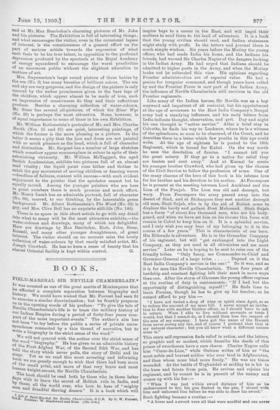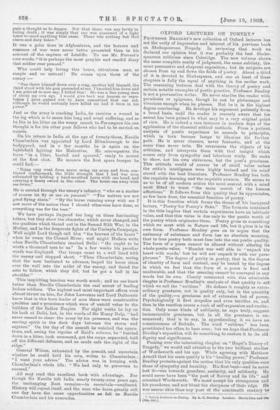BOOKS.
FIELD-MARSHAL SIR NEVILLE CHAMBERLAIN.*
IT was counted as one of the great merits of Montesquieu that be effected a complete separation between biography and history. We could have wished that Mr. Forrest had seen fit to exercise a similar discrimination; but he frankly prepares us in the opening words of his preface : "To give the tale of Neville Chamberlain's life is to trace the military history of our Indian Empire during a period of forty-four years com- pact of the most important events." The author's aim has not been "to lay before the public a series of private corre- spondence connected by a thin thread of narrative, but to write a biography in the strict sense of the word." We will not quarrel with the author over the strict sense of the word " biography." He has given us an admirable history of the First Afghan War, of the Second Sikh War, and has told the story which never palls, the story of Delhi and its siege. Yet as we read this most arresting and informing book we are greedy enough to wish that there had been more human the small print, and more of that very brave and most human knight-errant, Sir Neville Chamberlain.
The book should be read both by those who in these latter
days wish to learn the secret of British rule in India, and by those, all the world over, who love to hear of "mighty
men and dreadful derring dooms." It is a book which will
L. two of Pield-Marshal Sir Neville Chamioerlain, G.C.B. By G. W. Forrest, London W. Blackwood and Bons. 118s. n
inspire boys to a career in the East, and will impel their mothers to send them to the laud of adventure. It is a book that the young civilian should read, and Indian statesmen might study with profit. In the letters and journal there is much simple wisdom. Six years before the Mutiny the young officer, who had made India his home, and the Indians his friends, had warned Sir Charles Napier of the dangers lurking in the Indian Army. He had urged that Indians should be admitted to higher posts in the Army, and when the Mutiny broke out he reiterated this view. His opinions regarding Frontier administration are of especial value. He had a genius for irregular command, and though years have rolled by and the Frontier Force is now part of the Indian Army, the influence of Neville Chamberlain still survives in the old Frontier regiments.
Like many of the Indian heroes, Sir Neville was as a boy wayward and impatient of all restraint, but his appointment at the age of seventeen to the East India Company's Bengal army had a steadying influence, and his early letters from India indicate thought, observation, and grit. Day and night his one thought is " active service." After a brief stay in Calcutta, he finds his way to Lucknow, where lie is a witness of the splendours, so soon to be obscured, of the Court, and he describes them in a letter which few youths in this age could write. At the age of eighteen he is posted to the 16th Regiment, which is bound for Kabul. On the way north he sees the desolation of famine. "I cannot tell you the great misery. If they go to a native for relief they are beaten and sent away." Aud at Kurnal lie meets his younger brother Crawford, who had given up the chance of the Civil Service to follow the profession of arms. One of the many charms of the hero of this book is his intense love for his brother and his devotion to his mother. At Ferozepore he is present at the meeting between Lord Auckland and the Lion of the Punjab. The Lion was old and decrepit, but wary. From Ferozepore the army passed away into the desert of Sind, and at Shikarpore they met another decrepit old man, Shah Sujah, who is by the aid of British arms to displace the hardy and gallant Dost Mahomed. Shah Sujah has a force " of about five thousand men, who are his body- guard, and when we have set him on his throne this force will remain in Cabul to keep him on it. It is a splendid service, and I only wish you may hear of my belonging to it in the course of a few years." This is characteristic of our hero.
His Eldorado is adventure. He is in the Grenadier Company of his regiment, but will " get exchanged into the Light Company, as they are used in all skirmishes and see most service." Later on he is hoping to be sent to raise one of the friendly tribes. " Only fancy, me Commander-in-Chief and
Governor-General of a largo tribe Depend on it the East India Company's service is the one!" So it was, and so it is for men like Neville Chamberlain. Those four years of hardship and constant fighting left their mark in more ways than one. After the sterns of Ghuznee the young officer repines at the routine of duty in cantonments : "If I had but the opportunity of distinguishing myself !" He finds time to learn Persian, though he has to give up his teacher, as he cannot afford to pay him:—
"I have not tasted a drop of wine or spirit since April, so as to reduce the amount of my mess bill. I never accept an invita- tion to dine with another brother officer, as I should have to ask in return. Were I able to live without servants or tents I would, but that I cannot do, or I should then lose the respect of the men of my company. I have got the name of the Hermit from never seeing any one, and of course I pretend that that is my natural character ; but you all know what a different nature mine is."
This stern self-repression finds relief in action, and the letters, so graphic and so modest, which describe the deeds of this prince of swordsmen have a rare charm. Charles Napier calls him "Coeur-de-Lion," while Outram writes of him as " the most noble and bravest soldier who ever trod in Afghanistan, and than whom none bled more freely." He was six times wounded. At the battle of Urghundab at midday he is hit in the knee and faints from pain. He revives and rejoins his regiment, and by sunset he is in pursuit of the enemy and comes up with his foe When I was just within sword distance of him as he endeavoured to fire, his gun flashed in the pan, I closed with him and unhorsed hint before he was able to draw his sword."
Such fighting became a routine:— " A. horse and a sword were all that were needful and one never gave a thought as to danger. Not that there was any lovity in facing death ; it was simply that one was possessed of a light heart to meet anything that came. There was nothing but God above and duty below."
It was a grim time in Afghanistan, and the horrors and romance of war were never better presented than in his account of the capture of Istaliffe. To use Mr. Forrest's own words, " it is perhaps the most graphic and candid diary that soldier ever penned."
Who could help loving this brave, chivalrous man, so simple and so natural! He comes upon three of the enemy :—
" One threw himself down over a crag, another hid himself, the third stood with his gun presented at me. I knocked him down and I am grieved to now say, I killed him! He was a fine young man of about my own age. I would give back any honour or repu- tatioa I have gained not to have committed that one act, although he would certainly have killed me had it been in his power.'
Just as the army is reaching India, he receives a wound in the leg which is to cause him long and cruel suffering, and as he lies in his litter on the weary march to Ferozepore his one thought is for the other poor fellows who had to be carried on camels.
On his return to India at the age of twenty-three, Neville Chamberlain was appointed by Lord Ellenborough to the bodyguard, and in a few months he is again on the battlefield fighting the Mabrattas. He accompanies the forco " in a litter, booted and spurred," ready to mount at the first shot. 1:Te mounts the first spare trooper he could find:—
" Ban very weak from never using my arms and from con- tinued confinement, the little strength that I had was soon exhausted by holding a hard-mouthed horse with one hand, and carrying a heavy sword in the other. The brute ran away with me twice."
He is carried through the enemy's infantry, "who as a matter of course let fly at me, en passant." "The natives are not
good flying shots." ":By the horse running away with me I saw more of the action' than I should otherwise have done, so everything was for the best."
Wo have perhaps lingered too long on these fascinating letters, but they show the character, which never changed, and the qualities which blazed out in the Second Sikh War, in the Mutiny, and in the desperate fights of the Umbeyla Campaign. Well might Lord Gough call him " the bravest of the brave " when he swam the Chenab River; well might Hodson write when Neville Chamberlain reached Delhi : " He ought to be worth a thousand men to us." In a few weeks his peculiar worth was displayed. Our troops came to a wall lined with the enemy and stopped short. " Then Chamberlain, seeing that the men hesitated to advance, leaped his horse clean over the wall into the midst of the enemy, and dared the
men to follow, which they did, but he got a ball in his shoulder."
This inspiriting heroism was worth much ; and no one knew better than Neville Chamberlain the real secret of leading Indian soldiers. The highest and most important dikes were almostthrust on him, for John Lawrence and Lord Dalhousie knew that in this born leader of men there were constructive 0:kitties and is prescience which were of untold value to the builders of the Indian Empire. For eight weeks be lay on his back at Delhi, but, in the words of Sir Henry Daly, " had never ceased to cheer the army by his presence, and was the moving spirit in the dark days between the storm and capture." On the day of the assault be watched the opera- tions, and, seeing the repulse of Reid's column, he " hurried down in-a litter, took command, got the corps separated, told off the different defences, and so made safe the right of the ridge."
General Wilson, exhausted by the assault, and uncertain whether he could hold his own, writes to Chamberlain : "I want your advice." The advice was in keeping with Chamberlain's whole life : " We had only to persevere to succeed."
:All may read this excellent book with advantage. For though Sir Neville left India nearly twenty-nine years ago, the unchanging East remains—in essentials—unaltered. History will repeat itself, and the man who dares greatly will one day have the same opportunities -as fell to Neville Chamberlain and his comrades.











































 Previous page
Previous page